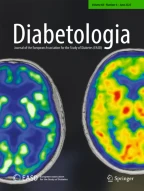Abstract
Aims/hypothesis. In adult pancreatic regeneration models exocrine acini are found to transdifferentiate to duct-like complexes. This has also been associated with the formation of new endocrine islet cells. We aimed to establish an in vitro model in which this transdifferentiation process is characterised and can be modulated.¶Methods. Purified rat pancreatic acini were cultured in suspension. Differentiation was analysed by immunocytochemistry, electron microscopy, western blotting and RT-PCR.¶Results. During culture acinar cells directly transdifferentiated without dividing, the cells lost their acinar phenotype and started to express cytokeratins 20 and 7 and fetal liver kinase-1 (Flk-1) receptors for vascular endothelial growth factor. Expression of the acinar pancreatic exocrine transcription factor (PTF-1) remained and the pancreatic duodenal homeobox-containing transcription factor (PDX-1) was induced. When transdifferentiation was completed, the cells started to express protein gene product 9.5, a pan-neuroendocrine marker. By combining these features, the transdifferentiated cells show similar characteristics to precursor cells during active beta-cell neogenesis. We were able to modulate the differentiation state by addition of nicotinamide or sodium butyrate, agents which are known to stimulate endocrine differentiation in other models.¶Conclusion/interpretation. Here, we present an in vitro system in which the cellular differentiation of putative pancreatic endocrine precursor cells and their PDX-1 expression can be modulated, thereby providing a possible model for the study of beta-cell transdifferentiation. [Diabetologia (2000) 43: 907–914]
Article PDF
Similar content being viewed by others
Avoid common mistakes on your manuscript.
Author information
Authors and Affiliations
Additional information
Received: 31 January 2000 and in revised form: 23 March 2000
Rights and permissions
About this article
Cite this article
Rooman, I., Heremans, Y., Heimberg, H. et al. Modulation of rat pancreatic acinoductal transdifferentiation and expression of PDX-1 in vitro. Diabetologia 43, 907–914 (2000). https://doi.org/10.1007/s001250051468
Issue Date:
DOI: https://doi.org/10.1007/s001250051468
